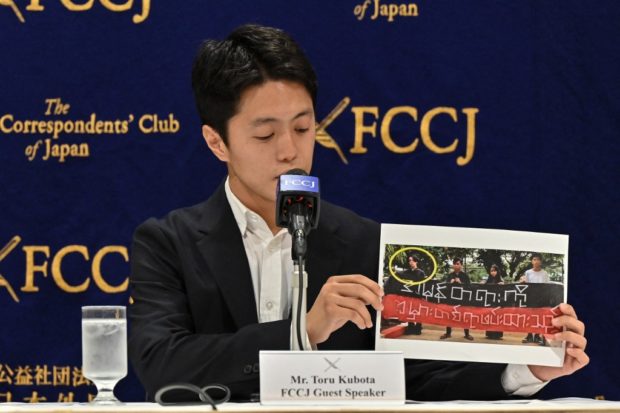
Japanese documentary maker and journalist Toru Kubota, who was recently released from Myanmar in a prisoner amnesty, holds up an image of himself prior to his arrest during a press conference at the Foreign Correspondents’ Club of Japan in Tokyo on November 28, 2022. Kubota spent three and a half months in prison after being detained near an anti-government rally in Yangon in July along with two Myanmar citizens. (Photo by Richard A. Brooks / AFP)
Tokyo, Japan — A Japanese journalist released from Myanmar in a prisoner amnesty called on Monday for Tokyo to put more pressure on the junta and accept refugees fleeing the Southeast Asian country.
Toru Kubota spent three-and-a-half months in prison after being detained near an anti-government rally in Yangon in July along with two Myanmar citizens.
Thousands of people have been jailed during a bloody crackdown on dissent in Myanmar since a military coup in February 2021.
Kubota, 26, was sentenced to seven years in jail for filming an anti-coup protest and also received a three-year sentence for violating Myanmar’s immigration laws.
He was released on November 18 along with thousands of other prisoners, including former British ambassador Vicky Bowman and Australian economist Sean Turnell, an adviser to ousted leader Aung San Suu Kyi.
Kubota urged Japan, which has long been a major donor and investor, “to take a strong proactive approach to human rights violations in Myanmar and also to more proactively criticise Myanmar for that”.
He said in Tokyo on Monday Japan should “scrutinize very strictly whether such funds are being used by the military, flowing to the military, and whether the funds are essentially being used to kill people”.
Japan announced after the coup it would halt all new aid projects, although existing programs were not affected, and Tokyo has stopped short of imposing sanctions on military and police commanders.
The defense ministry said in September it was ending a controversial program training members of Myanmar’s military.
Kubota also urged Tokyo to accept more refugees from Myanmar. Japan is a signatory to the UN Refugee Convention but takes in a handful of refugees from conflicts around the world each year.
“What we need to think about is how to protect those people who fled authoritarian rule,” Kubota said.
He described conditions during his initial detention as “hellish” and said he was held in solitary confinement at the notorious Insein prison.
But he said his release in an amnesty for almost 6,000 prisoners felt like a “propaganda tool”.
“It doesn’t change the fact that about 12,000 people are still in detention unduly,” Kubota said.